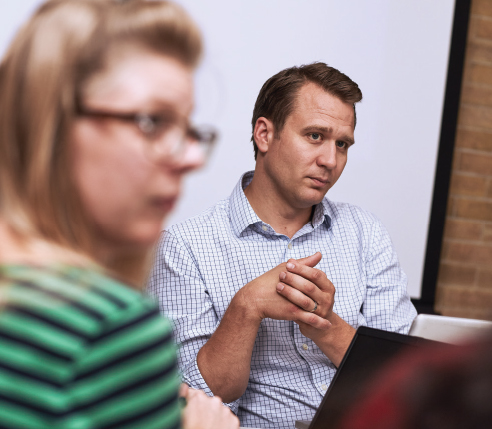Student
Programs

World-leading teaching
The Munk School brings together top scholars, accomplished professionals, passionate global citizens and some of the world’s most talented students. They form a unique community devoted to understanding and meeting the challenges of a fast-changing world. At the heart of that community are the School’s 15 teaching programs and specializations, where our approximately 640 undergraduate and 270 graduate students gain the hard and soft skills they need to excel in their fields, as well as an understanding of the broader economic, political and social issues at play in global affairs.
- Undergraduate programs
- American Studies
- Dr. David Chu Program in Contemporary Asian Studies
- European Studies
- Hellenic Studies
- Hungarian Studies
- Munk One Program
- Peace, Conflict and Justice Program
- South Asian Studies
- Graduate programs
- Collaborative Graduate Specialization in Ethnic and Pluralism Studies
- Collaborative Master’s and Doctoral Program in South Asian Studies
- Collaborative Master’s Program in Contemporary East and Southeast Asian Studies
- Master of Arts in European and Russian Affairs
- Master of Global Affairs
- Master of Public Policy (Sciences Po)/
Master of Global Affairs (University of Toronto)
(Accepting applications for fall 2018)
- Certificate Programs
- Fellowship in Global Journalism
master of global affairs
The complexity of the world’s challenges is growing constantly. Emerging leaders are choosing the Master of Global Affairs (MGA) program because it equips graduates with a deep understanding of global issues, and the resiliency to navigate unprecedented change.
New Dual Master’s Program with Sciences Po
This year, the Munk School of Global Affairs launched a dual degree program in partnership with the Sciences Po School of Public Affairs in Paris. Beginning in 2018, students will be able to pursue an intensive 24-month course of study to earn both an MGA from the Munk School and a Master in Public Policy (MPP) from Sciences Po.
Through complementary studies at these two leading institutions, students will gain access to richly varied European and North American perspectives on international issues. “This dual master’s degree is a first for the Munk School, and we’re thrilled to have an experienced partner in Sciences Po,” said Stephen Toope, director of the Munk School.
Attracting Top Students
This year the Munk School’s MGA program continued to grow its pool of outstanding applicants, both domestic and international, even as many professional schools saw declining enrolments. One standout international applicant was Linda De Gouveia (MGA ’18) of South Africa, the first MGA student to receive a Queen Elizabeth II Diamond Jubilee Scholarship. The Munk School was also proud to celebrate three graduating MGA students – Emile Lavergne, Bojana Radan and Michael Thomas – for winning 2017 Gordon Cressy Student Leadership Awards. Named for an esteemed U of T leader, this award recognizes students who have made outstanding extracurricular contributions to their college, faculty or school, or to the University as a whole.
MGA 2016-2017
| MGA 2015-16 | MGA 2016-17 | YOY Growth | |
|---|---|---|---|
| Total Applicants |
450 | 550 | 22% |
| Domestic Applicants |
354 (79%) | 409 (74%) | 16% |
| International Applicants |
96 (21%) | 141 (26%) (from 52 countries) |
47% |
| MGA 2015-16 | |
|---|---|
| Total Applicants |
450 |
| Domestic Applicants |
354 (79%) |
| International Applicants |
96% (21%) |
| MGA 2016-17 | |
|---|---|
| Total Applicants |
550 |
| Domestic Applicants |
409 (74%) |
| International Applicants |
141 (26%) (from 52 countries) |
| YOY Growth | |
|---|---|
| Total Applicants |
22% |
| Domestic Applicants |
16% |
| International Applicants |
47% |
MGA Professional Internships
This year, MGA students gained valuable experience at world-leading organizations and connected with key networks through professional internships in 18 countries. Over half of our students undertook their internships in global innovation cities like London, Bangkok and New York; a quarter were in diplomatic centres like Geneva, The Hague and Washington; and the final quarter were in cities located in developing regions, such as Buenos Aires, Cape Town and Kampala.
MGA Internships 2016-2017
 |
62 Internship Organizations |
18 Countries Around The World |
More Than 60% Of All MGAS undertook their internships outside of Canada |
Sector Breakdown (2016-2017)
Region Breakdown (2016-2017)
munk one
Munk One is a foundation-year program that offers first-year students the opportunity to develop a strong grounding in global issues through specialized seminars and labs. Successful students can extend their learning with summer study abroad. This year, supported by Canadian Friends of the Hebrew University of Jerusalem, five students, Kathryn Condon, Sonja Dobson, Abigail Lendvai, Adam Sheikh and Eilish Sibalis, travelled to the university for intensive field- based courses that investigate specific dynamics within the Arab-Israeli conflict.
The appeal of Munk One’s innovative offerings is evident in the calibre of students the program attracts. This year, the University welcomed four Loran Scholars, recipients of a top entrance scholarship valued at $100,000; two of these exceptional incoming students, Sayeh Yousefi and Aidan Harold, chose Munk One. “
[It’s]one of the reasons I came to U of T,” Yousefi said.
In 2017 the program celebrated its fourth year, and so we saw the first cohort of Munk One students graduate. We welcomed these talented graduates to the program’s first alumni event in April, and we’re excited to see their next steps.
A Different Kind of Incubator
This year saw the launch of the Munk One Incubator, a program that encourages students to develop entrepreneurial approaches to global challenges. While many institutions have developed incubator programs in recent years, they tend to focus on seeding and scaling viable enterprise ideas.
The Munk One Incubator stands apart in its commitment to using incubation as a tool to develop student capabilities first and promising ventures second. As Munk One Director Teresa Kramarz explains, traditional incubators are too preoccupied with students’ enterprises; by contrast, the Munk One Incubator treats “the
[incubation]process itself as a powerful pedagogical practice.”
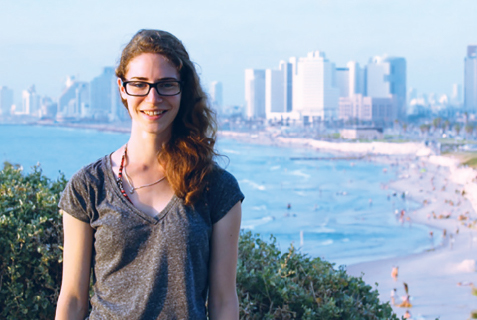
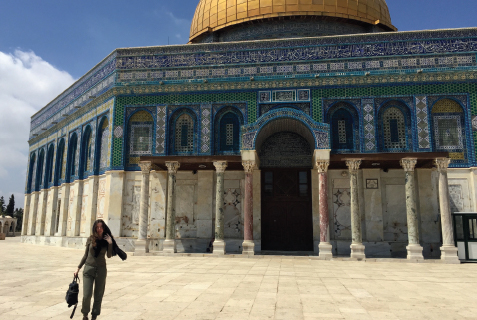
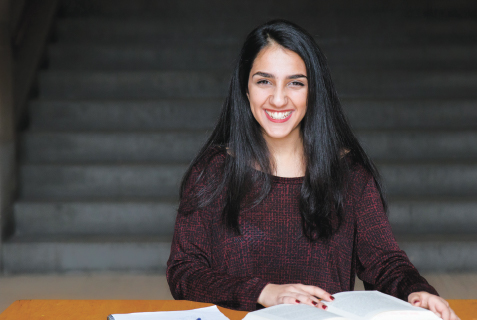

trudeau centre for peace, conflict and justice
In an increasingly interconnected world where understanding the roots of both conflict and peace is an urgent shared challenge, students in the Trudeau Centre’s Peace, Conflict and Justice (PCJ) undergraduate program are making a real difference.
Partnering for Peace
By delving into both classroom theory and the daily practice of a diverse range of organizations, students gain nuanced insights into the work of nurturing peace, justice and well-being. For several years, PCJ students have undertaken internships with organizations like GreenPAC, The Mosaic Institute and Médecins Sans Frontières. They also connect directly with people and organizations on the front lines of peace-building; this year PCJ students visited the Canadian Forces Peace Support Training Centre in Kingston, Ont., for insight into how Canadian troops prepare for a peacekeeping mission.
This year saw the launch of a new pilot course in service learning, through which 43 students earned course credit by working with organizations whose missions aligned with their academic interests in areas ranging from human rights and ecological justice to refugee support and indigenous issues. Building on the success of this pilot course, in 2017–18 PCJ students will have access to an expanded experiential-learning program that will let them devote the third year of their degree either to service learning or study abroad.
Convening Powerful Conversations
In February 2017, PCJ students organized a two-day conference entitled “Behind Closed Doors: Trafficking Labour, Sex, Art.” Conceived and led entirely by students, the gathering sparked critical interdisciplinary debates among scholars, practitioners and legal experts.
Leading Across the University
PCJ students earned recognition this year for their contributions at U of T and beyond. Sameen Zehra won the 2017 Dean’s Student Leadership Award, Faculty of Arts & Science, for, among other things, her work as president of the University of Toronto Refugee Alliance. Zehra was joined by fellow PCJ students Anah Mirza, McKinley Morris and Julie Zhang in receiving the Gordon Cressy Student Leadership Award for outstanding extracurricular contributions.
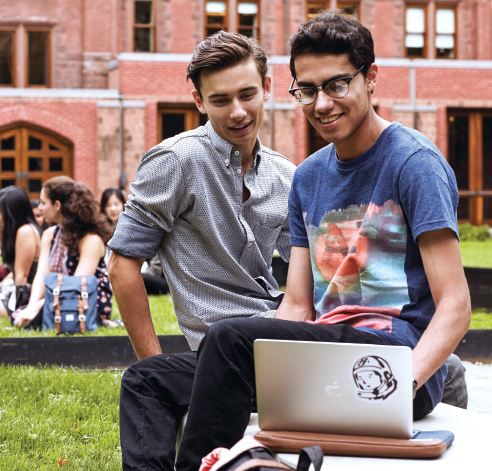
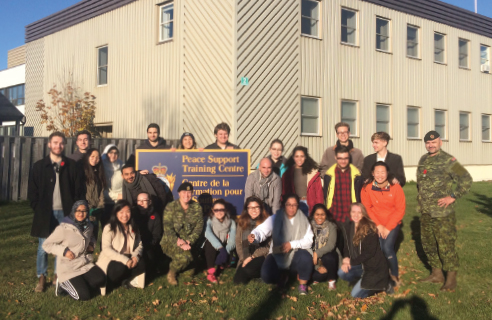
fellowship in global journalism
The Munk School’s Fellowship in Global Journalism (FGJ) is building a new kind of journalist. Unlike conventional journalism schools, the program attracts professionals working in diverse fields – fellows have included emergency room doctors, environmentalists, security specialists, entrepreneurs, neuroscientists and architects – and teaches them to practise outstanding journalism in their own disciplines and professional environments.
Getting the Story Out
Tackling everything from water security in Latin America to the spread of HIV in Russia, the Munk School’s fellows in global journalism have published over 120 news stories and weekly columns for leading global outlets in the past year, including Al Jazeera, The Globe and Mail, Deutsche Welle, The Guardian, The Irish Times and The Atlantic.
New Partners
This year the FGJ’s slate of media partners was larger than ever, with outlets like New York–based Quartz and U.K.-based New Scientist joining existing partners such as Foreign Policy, VICE and TVO. As the FGJ’s reputation for nuanced coverage on complex issues continues to grow, our expanding network of partnerships will bring our fellows’ uniquely situated reporting to new audiences.
Top of the Field
Dr. Seema Yasmin (FGJ ’14) was a finalist for the 2017 Pulitzer Prize in Breaking News Reporting for her work in the Dallas Morning News during the July 2016 targeted shootings of 14 police officers in Dallas, Tex. Her story profiled a Black doctor who worked to save the wounded police officers (five ultimately died), and it traced the doctor’s own complex relationship with his city’s police department.
